Why Conditionals Matter for IELTS Speaking
Conditionals show flexibility and complex sentence control — key Band 7 grammar traits. They help you:
- Sound natural and reflective (“If I had more time off work, I’d travel more.”)
- Give opinions hypothetically in Part 3 (“If governments invested more, education would improve.”)
- Add depth to storytelling in Part 2 (“If that hadn’t happened, I might not be where I am now.”)
⚡ Quick Reminder:
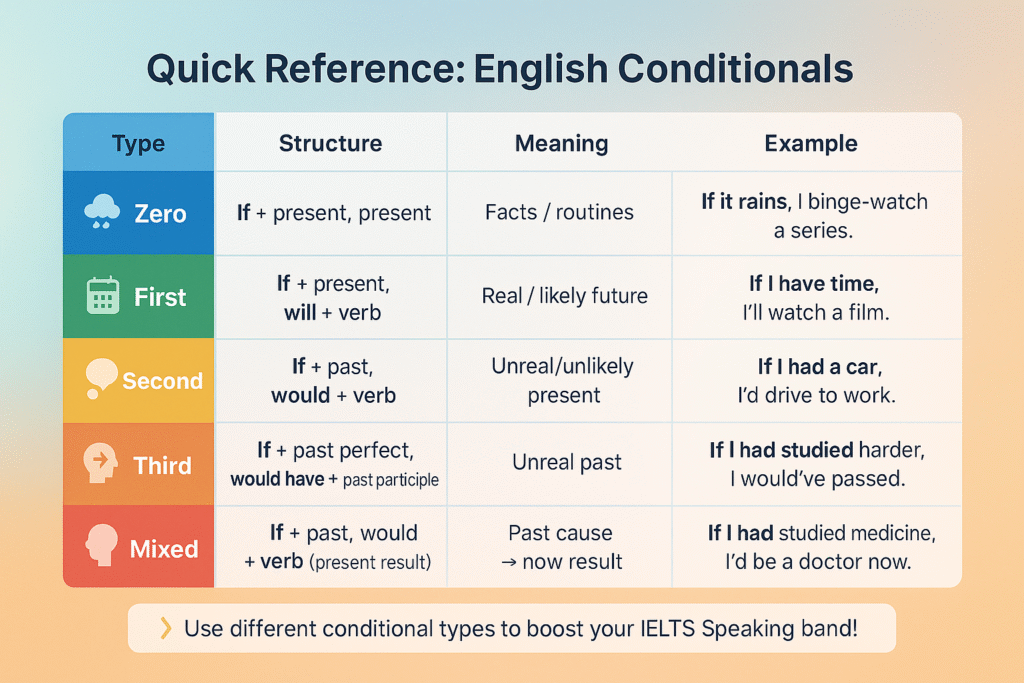
2 Common Mistakes Band 6 students make with Conditionals:
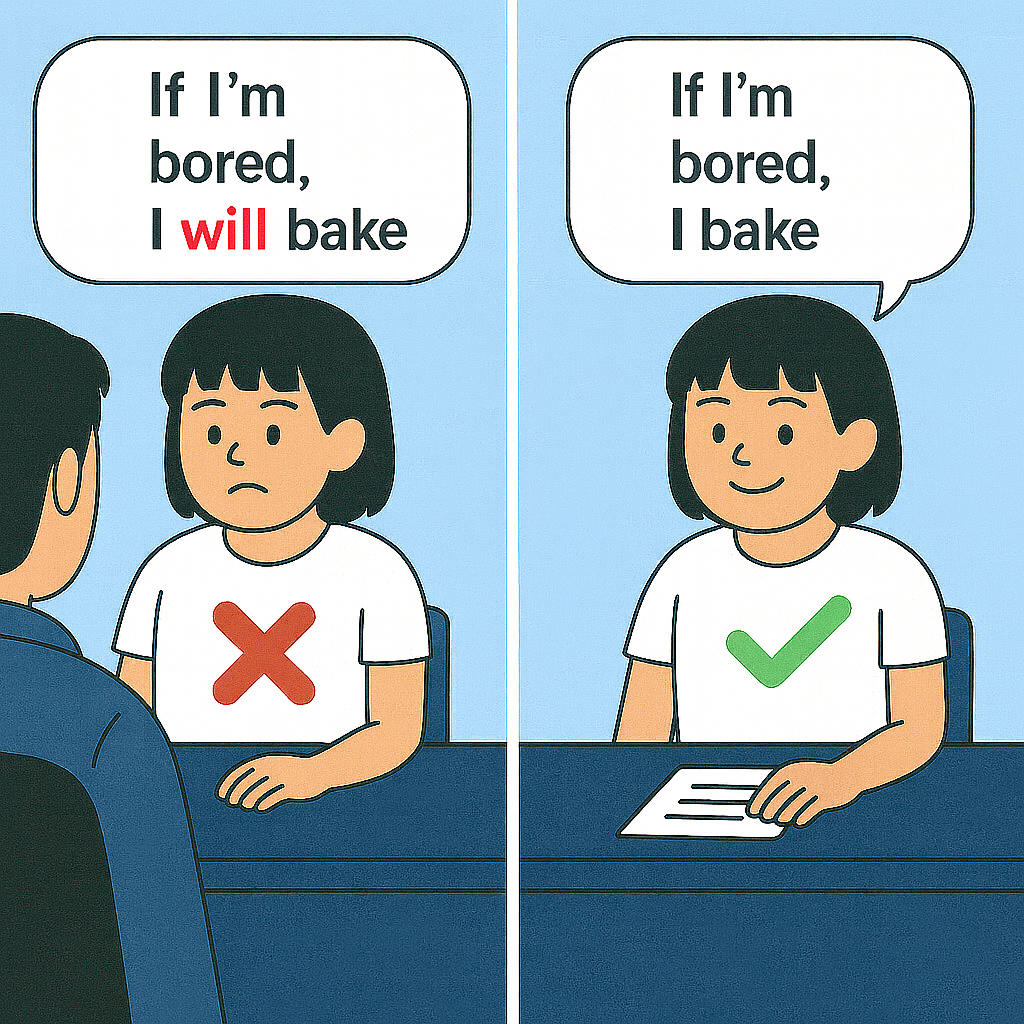
1) Band 6 students sometimes use the first conditional when the Zero conditional is required.
Note: This mistake is often seen by students from East Asian countries (China, Japan, Korea, Vietnam, Thailand & Myanmar)
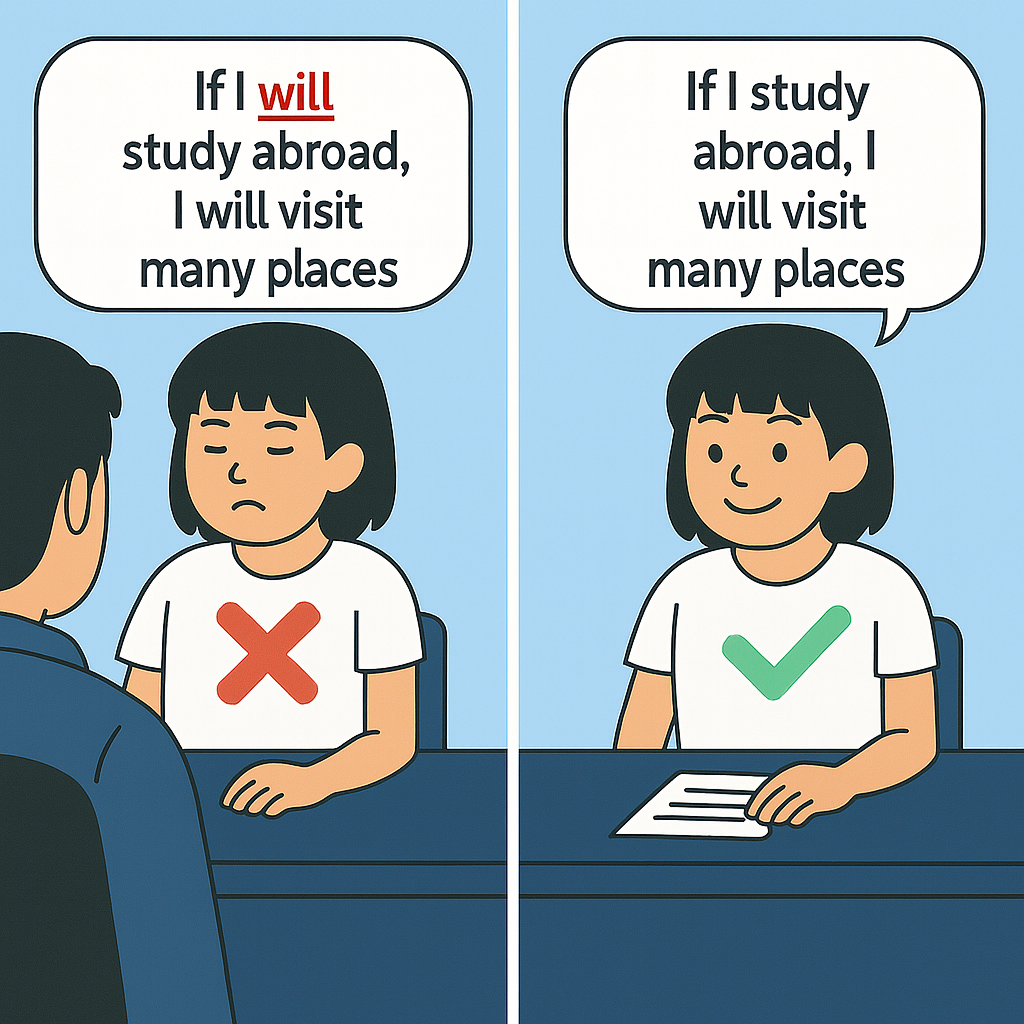
2) Band 6 students sometimes use “the”Will” in both clauses when using the first conditional.
Note: This mistake is often seen by students from Europe (German speaking countries & Slavic countries (Russia, Ukraine, Belarus, Czech Republic, Poland)
Use the Zero Conditional to sound natural in Part 1:
🔹 Common Topics + Natural Zero Conditional Answers
Here are some sample Part 1 topics with native-like answers that use if and when naturally.
Notice how these sentences describe habits and routines, not specific situations.
☕ Free Time & Weekends
- If I meet up with mates on the weekend, we usually grab a coffee and go for a walk.
- If I stay at home, I watch a series or read.
- If I have time, I call my parents for a chat.
🛒 Shopping & Daily Habits
- If I go shopping, I always bring my own bags.
- I always ask what the special is if I‘m at a restaurant.
- If I see a funny meme about politics, I send it to my close friend.
🌤️ Weather & Lifestyle
- If the weather is good, I usually head to the beach or a park.
- If the weather’s bad, I like to clean the house and do all my home tasks.
🍳 Food & Eating Habits
- If I’m in a hurry, I just grab a croissant and eat it on the way.
- If I’m tired, I tend to just eat something simple and watch some YouTube.
🎬 Entertainment
- If I go to the cinema, I always get popcorn — even if it’s a rip-off!
- If I go on holiday, I always explore in the morning and chill out in the evening.
🐶 Funny or Personal Habits
- If I try to give my dog a bath, he always runs away!
- My mate makes a funny noise if they laugh.
- I go to the gym If it’s less packed.
🧠 Study & Work
- If the teacher gives us homework, I try to finish it as soon as possible so I can chill out for the rest of the week.
- If my boss is on a business trip, I usually work from home.
Zero v First Conditional Confusion
The key rule is that aside from facts, the Zero conditional is used for general habits while the first conditional is about future plans.
Zero Conditional = General Habit / General Truth
(It’s what always happens in that situation. It is timeless.)
E.g. If my boss is on a business trip, I usually work from home.
First Conditional = Specific Future Plan / Prediction
(It’s what is going to happen in this specific upcoming scenario. It is anchored to the near future.)
E.g. If my boss is on a business trip, I will work from home.
🤔 Exercise 1- Practice making the Zero Conditional
Task: Complete the sentences with your own ideas.
(Use the present simple for both parts — e.g. “If I’m bored, I play video games.”)

Examples:
✅ If I’m tired, I go to bed early.
✅ If I head to the gym, I bring some water with me.
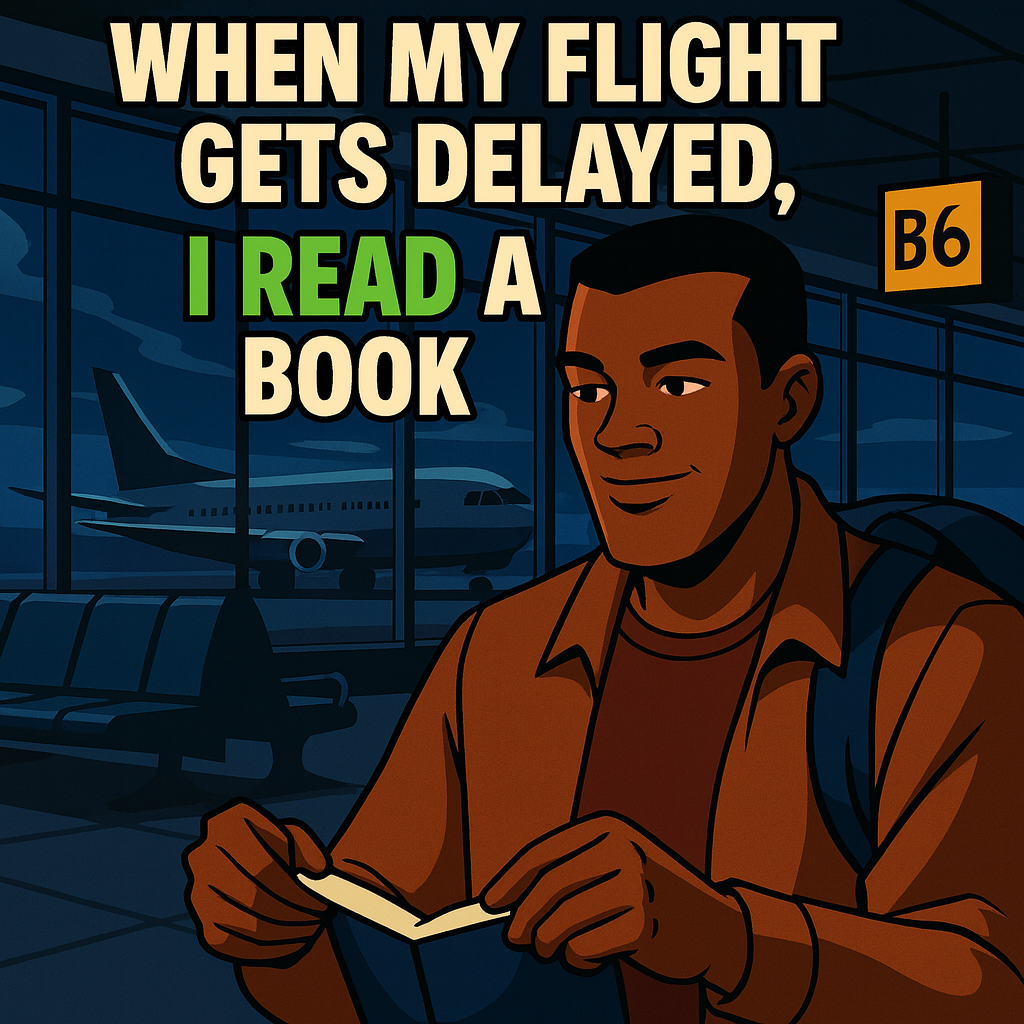
🌤 Everyday Moments
- If I’m bored, I …
- If I’m tired, I …
- If I feel stressed, I …
- If I’m sad, I …
- If I’m annoyed, I …
- If I travel, I …
- If I’m with my mates, we …
- If I go to the café, I usually …
- If my flight is delayed, I …
- If the weather is good, I usually …
- If the weather is bad, I usually …
- If I get home from school/work, I …
- If I cook dinner, I usually …
- If I get a day off, I …
- If there’s a party, I always …
- If I’m on a train, I …
- If I don’t understand something, I …
Potential Answers
- If I’m bored, I watch some Youtube videos.
- If I’m tired, I take a 10 minute power nap!
- If I feel stressed, I go for a walk.
- If I feel sad, I call a friend.
- If I’m annoyed, I head to the gym.
- If I travel, I always look up the best places to eat.
- If I’m with my mates, we take the piss out of each other.
- If I go to the cafe, I usually get a flat white or cappuccino.
- If my flight is delayed, I walk around the different shops.
- If the weather is good, I go for a hike.
- If the weather is bad, I stay in and watch tv.
- If I get home from work, I make dinner.
- If I cook dinner, I usually put on a podcast.
- If I get a day off, I go swimming and then to the sauna.
- If there’s a party, I always dance a lot.
- If I’m on the train, I read a book or do some work.
- If I don’t understand something, I ask AI to explain it to me.
💭 Exercise 2- Practice using multiple Zero Conditionals
Task: Answer the following questions using multiple conditionals, giving different scenarios to create a more detailed answer.
For example, if asked “What do you do in your spare time?”, the response could be:
If I’m on my own, I just go on Youtube or play video games…If I’m with my girlfriend, we usually do something active like hiking… If it’s sunny, I try to go to the beach or the park… If I’m with friends, we often head to the pub for a few beers and watch the match.
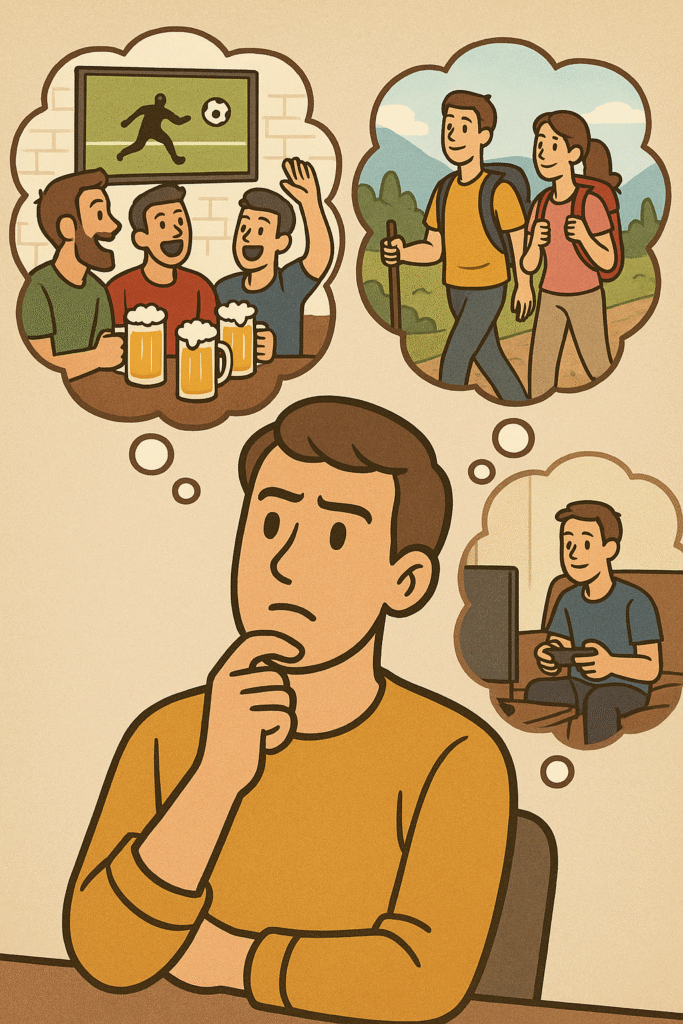
🎬 Getting to Know You
- What type of movies do you watch?
- What type of music do you listen to?
- What do you do for fun?
- What do you do on the weekend?
- What do you like to do on vacation?
- What food do you like?
Possible Answers
What type of movies do you watch?
If I’m on my own on a Saturday night, I stick on something with a really good plot.. one that’s based on a true story usually… but if I’m heading to the cinema with my girlfriend, we tend to compromise and we usually watch a comedy… and of course, if it’s Christmas, I love watching Christmas movies, like Elf and The Grinch.
What type of music do you listen to?
If I’m at home, I listen to all kinds of music, but if I’m out and want to dance and party, I love Latin music. If I’m doing some work at home, I tend to stick on some lofi or acoustic music, and if I’m going for long drives, I love Indie and 80’s music.
What do you do for fun?/ What do you do on the weekends?
If it’s good weather, I like to do something active, like hiking, cycling, tennis or just walking around the park with mates… If it’s winter, I love swimming and going to the sauna. If I’m on my own, I love just chilling out and binging on a good tv series.
What do you do on vacation?
If I’m with my mates, I like renting a bike or car and exploring…but if I’m with my girlfriend, I love going to the beach, eating out and checking out some historical places… and if I’m on my own, I usually go to some museums, exhibitions, stuff like that.
What food do you like?
If I’m really hungry, I order pizza… and if I’m with my family, we usually like to get some Chinese food… but if want to splash out, I treat myself with some good sushi!
🎶the 3rd & Mixed Conditional Song
Read the lyrics and sing along!
🕰️ Exercise 3- Using the 3rd or Mixed conditional in Part 2 questions about the past)
Very often you are asked to talk about something in the past. Here are some examples:
Describe an important decision you made.
Describe a time when you helped someone.
Describe an event you enjoyed.
Task: Take some time and i) think of an idea that you can talk about, then ii) make a 3rd conditional or Mixed conditional sentence related to it.
Example Question: Describe an important decision you made.
Answers:
If I had not quit my job, I wouldn’t have met my wife. (3rd conditional)
If I had not quit my job, I wouldn’t have a wife. (Mixed conditional)

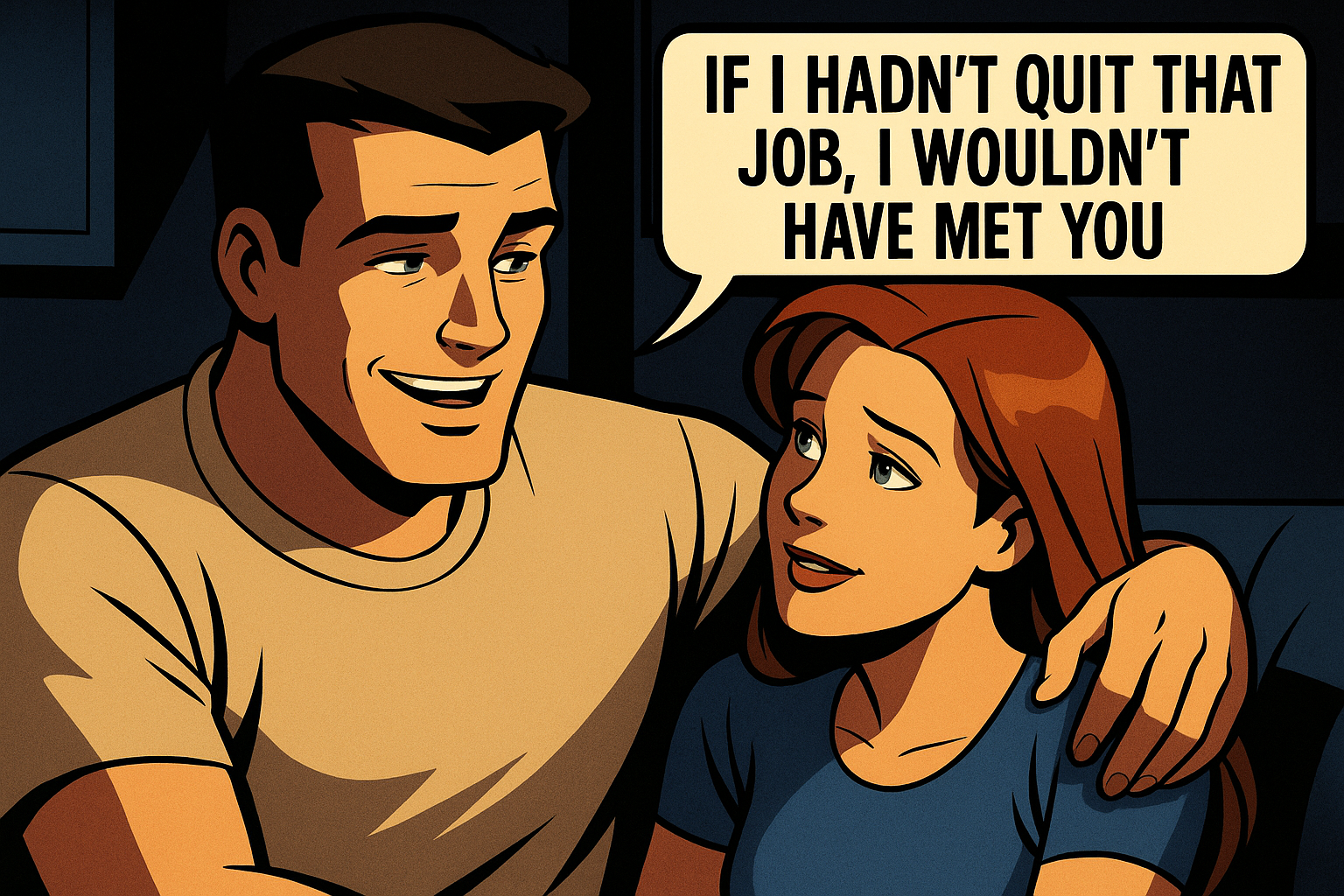
1. Describe a time when you got lost.
2. Describe a memorable journey.
3. Describe a time when you met someone interesting.
4. Describe something you achieved.
5. Describe a time when you worked hard on something.
6. Describe a difficult situation you overcame.
7. Describe a time when you learned something new.
Possible 3rd conditional sentences
1. Describe a time when you got lost: If I had taken the other route, I wouldn’t have got lost.
2. Describe a memorable journey: If I hadn’t travelled across Spain, I wouldn’t have started learning Spanish.
3. Describe a time when you met someone interesting: If I hadn’t joined that football team, I wouldn’t have met all those cool guys.
4. Describe something you achieved: If I had followed the typical career route, I probably wouldn’t have lived abroad in multiple countries.
5. Describe a time when you worked hard on something: If I hadn’t studied as hard as I did (including Christmas and New Year), I’m pretty sure I wouldn’t have got the grades I needed for university.
6. Describe a difficult situation you overcame: If I hadn’t asked for help when my car broke down, I would’ve been in big trouble.
7. Describe a time when you learned something new: If I had learned guitar formally instead of just from Youtube, I think I’d have learned much more.
Possible Mixed conditional sentences
1.Describe a time when you got lost: If I had taken the other route, I wouldn’t be so nervous about driving in new places now.
2. Describe a memorable journey:
If I hadn’t travelled across Spain, I wouldn’t be so passionate about Spanish culture today.
3. Describe a time when you met someone interesting:
If I hadn’t joined that football team, I wouldn’t still be friends with those guys today.
4. Describe something you achieved:
If I had followed the typical career route, I probably wouldn’t be living abroad now.
5. Describe a time when you worked hard on something:
If I hadn’t studied as hard as I did (including Christmas and New Year), I wouldn’t be at this university now.
6. Describe a difficult situation you overcame:
If I hadn’t asked for help when my car broke down, I’d probably still be stuck on the road today.
7. Describe a time when you learned something new:
If I had learned guitar formally instead of just from YouTube, I’d be a much better player now.
🎶the 2nd Conditional Song
Read the lyrics and sing along!
2nd Conditional Comic 💥
Task: Look through the scenes and use the prompts to think of your own answers!
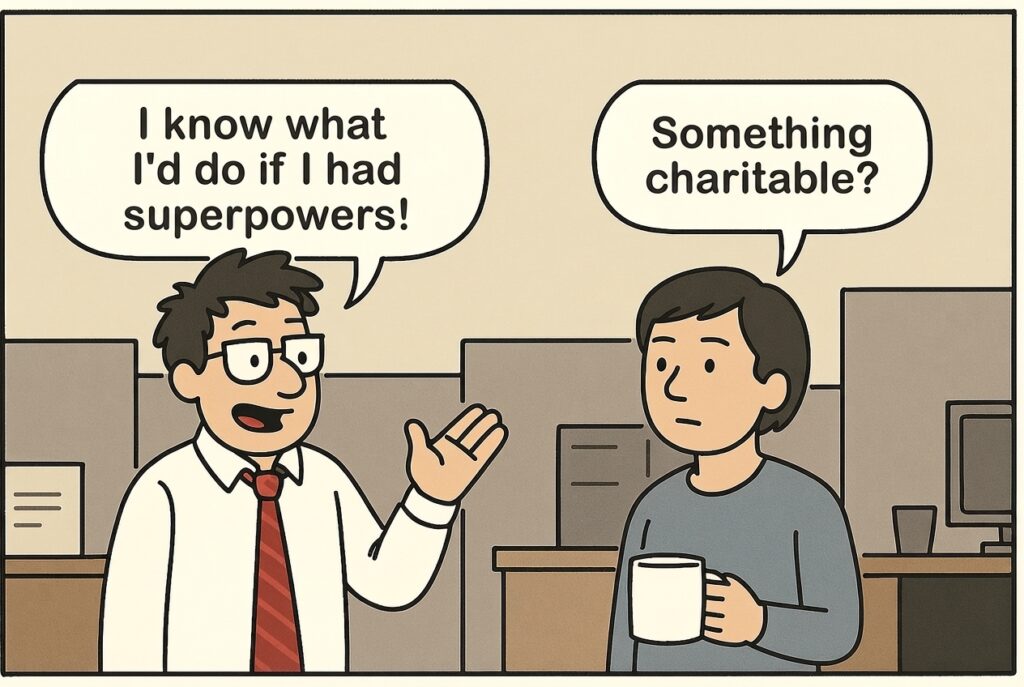
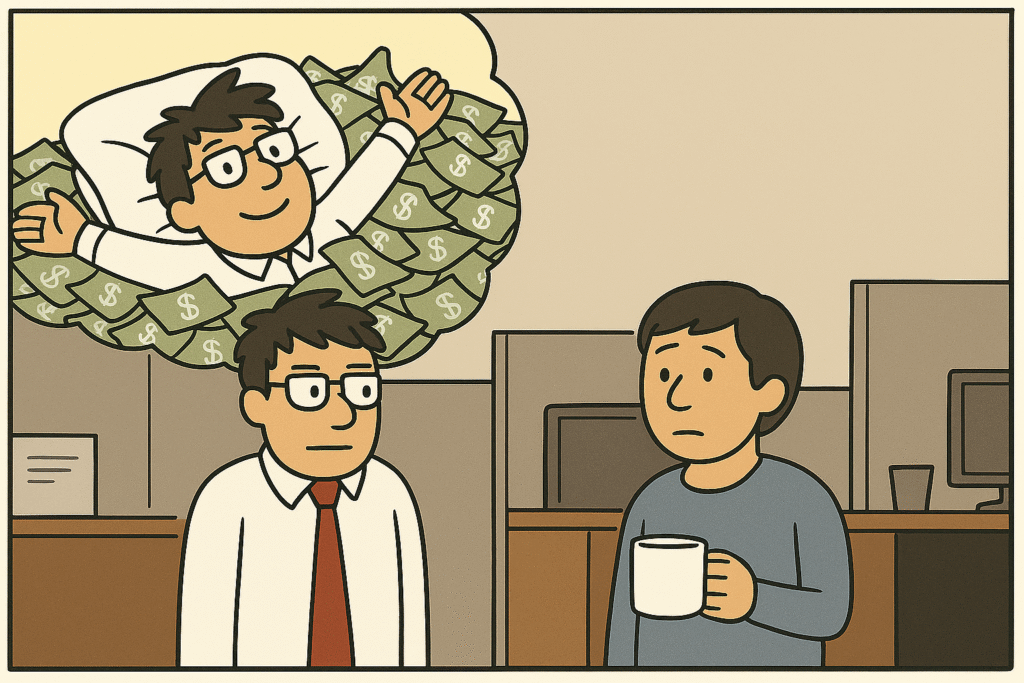
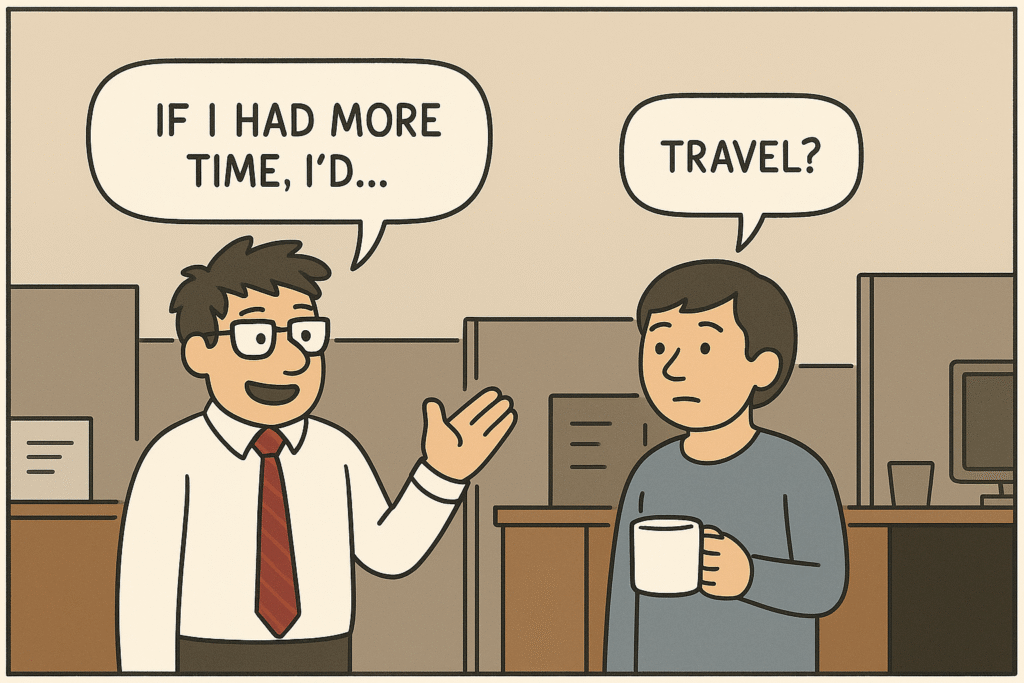
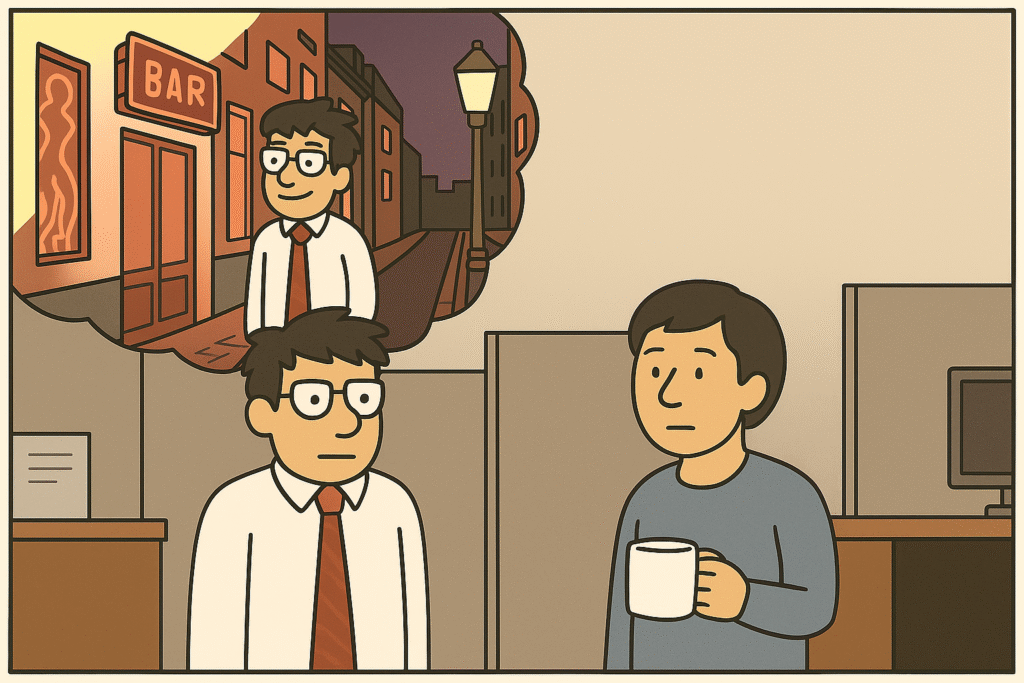
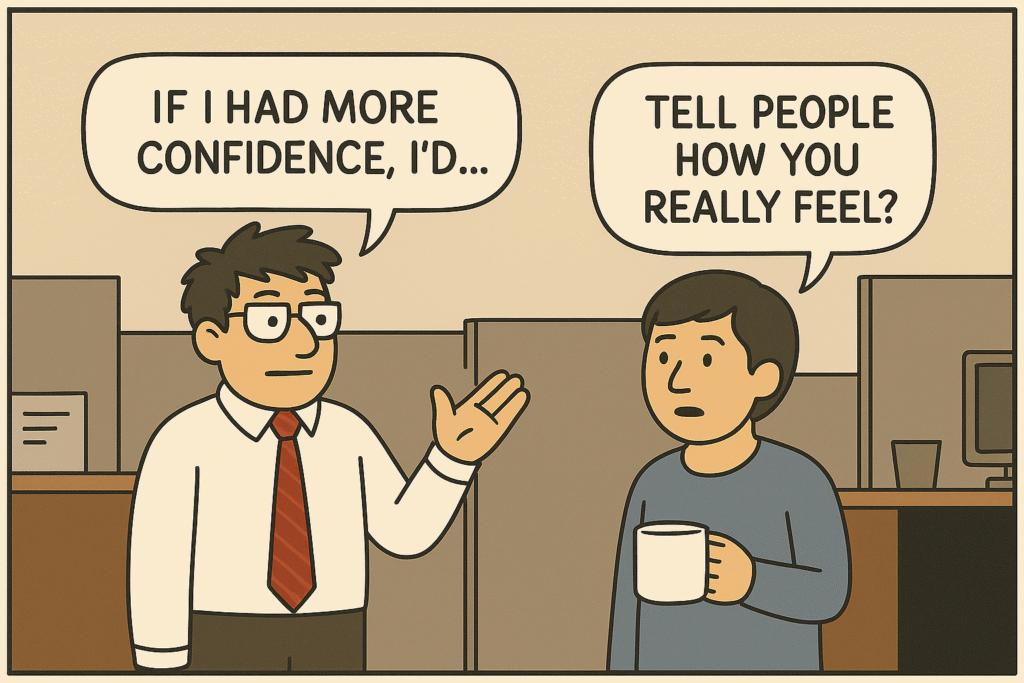
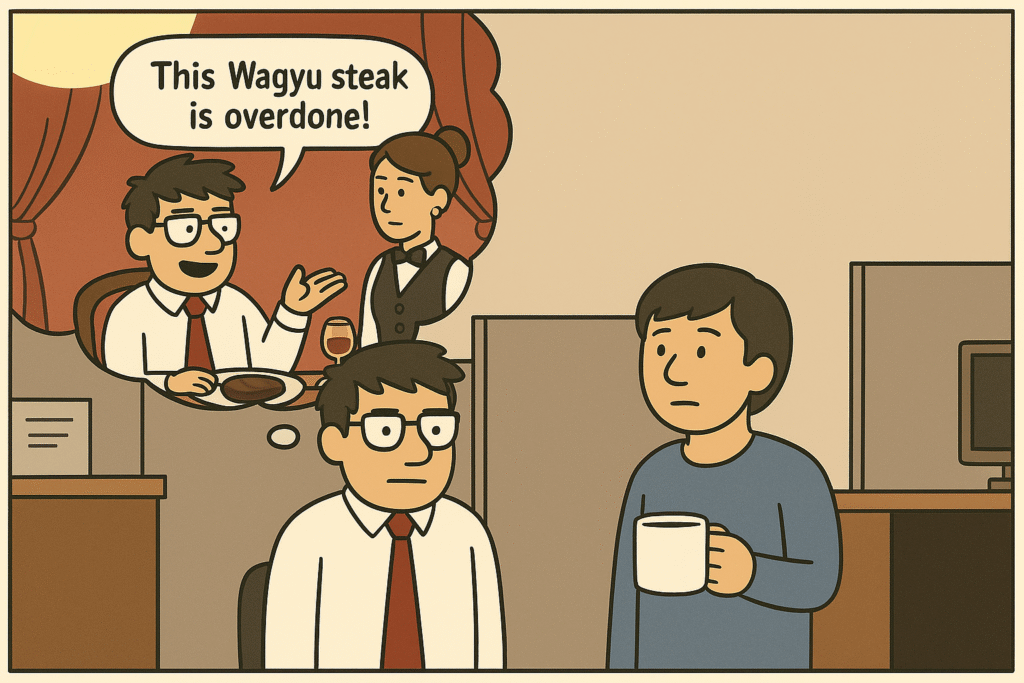
🖼️ Exercise 4- Practice Using the 2nd conditional in Part 3 to Expand Answers)
🌱 Task: Expand on the following responses with a 2nd conditional to illustrate and build on an idea.

Example:
Question: How important is it to travel and experience different cultures?
Answer:
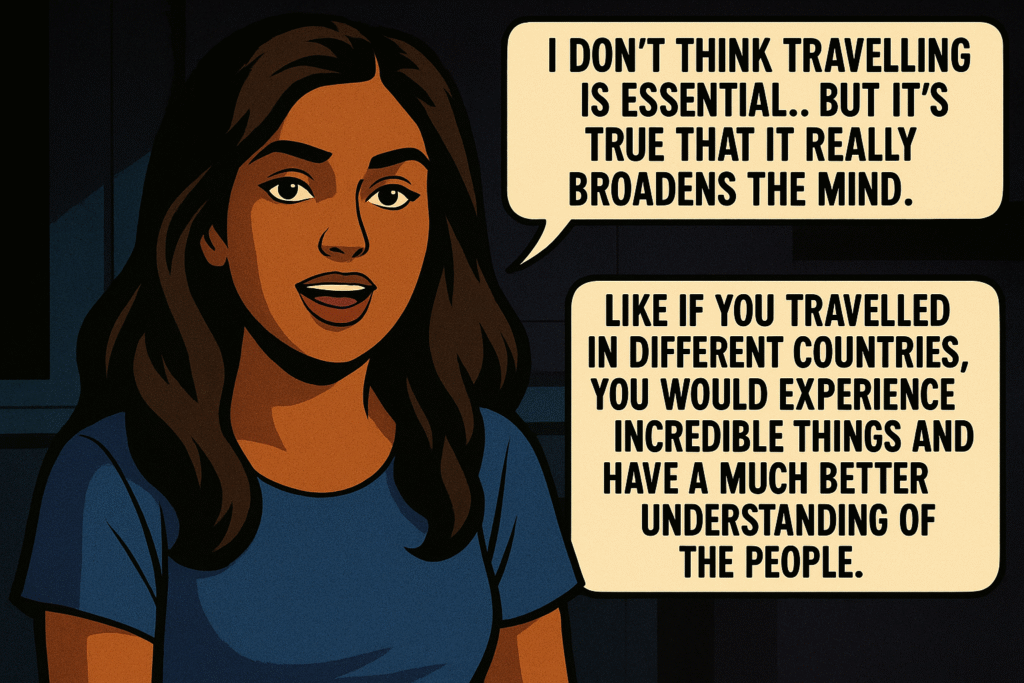
1. What are the benefits of learning a foreign language?
2. How can schools make learning more interesting?
3. Do you think all children should learn art?
4. Do you think job satisfaction is more important than salary?
5. How can public transport be improved in large cities?
6. How can individuals help protect the environment?
7. Why is it important to preserve traditional culture?
8. Should children learn about other cultures in school?
9. Do you think tourism is good or bad for local cultures?
10. Should governments punish people who waste resources?
11. What are the pros and cons of using robots at work?
12. Do you think technology makes people more isolated?
13. Should there be limits on how tall buildings can be?
14. What are the main causes of stress in modern society?
15. How can governments encourage people to live healthier lives?
16. Do you think fast food should be banned in schools?
17. Should students be allowed to choose all their subjects?
18. Should people change jobs often?
19. Do you think working long hours is necessary to be successful?
20. How do traditions influence people’s behaviour?
21. Should artists be paid more for their work?
Possible Answers
1. What are the benefits of learning a foreign language?
It can help you get a job. Like, if you wanted to work in an international country, being fluent in English would probably help you land the job.
2. How can schools make learning more interesting?
I think there are lots of ways. If schools used technology more, I reckon kids would be far more engaged.
3. Do you think all children should learn art?
Yeah, I think so. If every child learnt art, they’d be more creative and confident.
4. Do you think job satisfaction is more important than salary?
Definitely. If people only cared about money, they’d end up feeling miserable.
5. How can public transport be improved in large cities?
They could add more routes and make it cheaper. If buses were more frequent, more people would use them.
6. How can individuals help protect the environment?
We can all do small things. If everyone recycled properly, it would make a huge difference.
7. Why is it important to preserve traditional culture?
It keeps us connected to our roots. If we ignored traditions, we’d lose part of who we are.
8. Should children learn about other cultures in school?
Absolutely. If kids learnt more about other cultures, they’d grow up more open-minded.
9. Do you think tourism is good or bad for local cultures?
It’s both. If it were managed carefully, tourism would actually help preserve local traditions.
10. Should governments punish people who waste resources?
To some extent, yes. If there were tougher penalties, people would be more responsible.
11. What are the pros and cons of using robots at work?
Robots can boost productivity. But if companies relied too much on them, many people would lose their jobs.
12. Do you think technology makes people more isolated?
Sometimes it does. If we spent less time online, we’d probably feel closer to others.
13. Should there be limits on how tall buildings can be?
Maybe. If there were height limits, cities would look more balanced and less overcrowded.
14. What are the main causes of stress in modern society?
Work and money, mainly. If people didn’t have so much pressure, they’d feel much calmer.
15. How can governments encourage people to live healthier lives?
They could offer more support. If the government provided free gyms, more people would exercise.
16. Do you think fast food should be banned in schools?
Yes, I do. If schools banned it, students would eat healthier meals.
17. Should students be allowed to choose all their subjects?
Not all. If they chose everything, some might skip important subjects like maths.
18. Should people change jobs often?
It depends. If people switched too often, they’d struggle to build a stable career.
19. Do you think working long hours is necessary to be successful?
Not really. If success depended on that, lots of people would just burn out.
20. How do traditions influence people’s behaviour?
They shape how we act and think. If traditions disappeared, society would lose its sense of identity.
21. Should artists be paid more for their work?
Yes, they deserve it. If artists were paid fairly, more people would see art as a serious career.
🎶the 1st Conditional Song
Read the lyrics and sing along!
🧐 Exercise 5- Practice using the first conditional to speculate/ predict
Task: Expand on the following responses with a 1st conditional to illustrate and build on an idea.

Example:
Question: How will technology change the way we work in the future?
Answer:
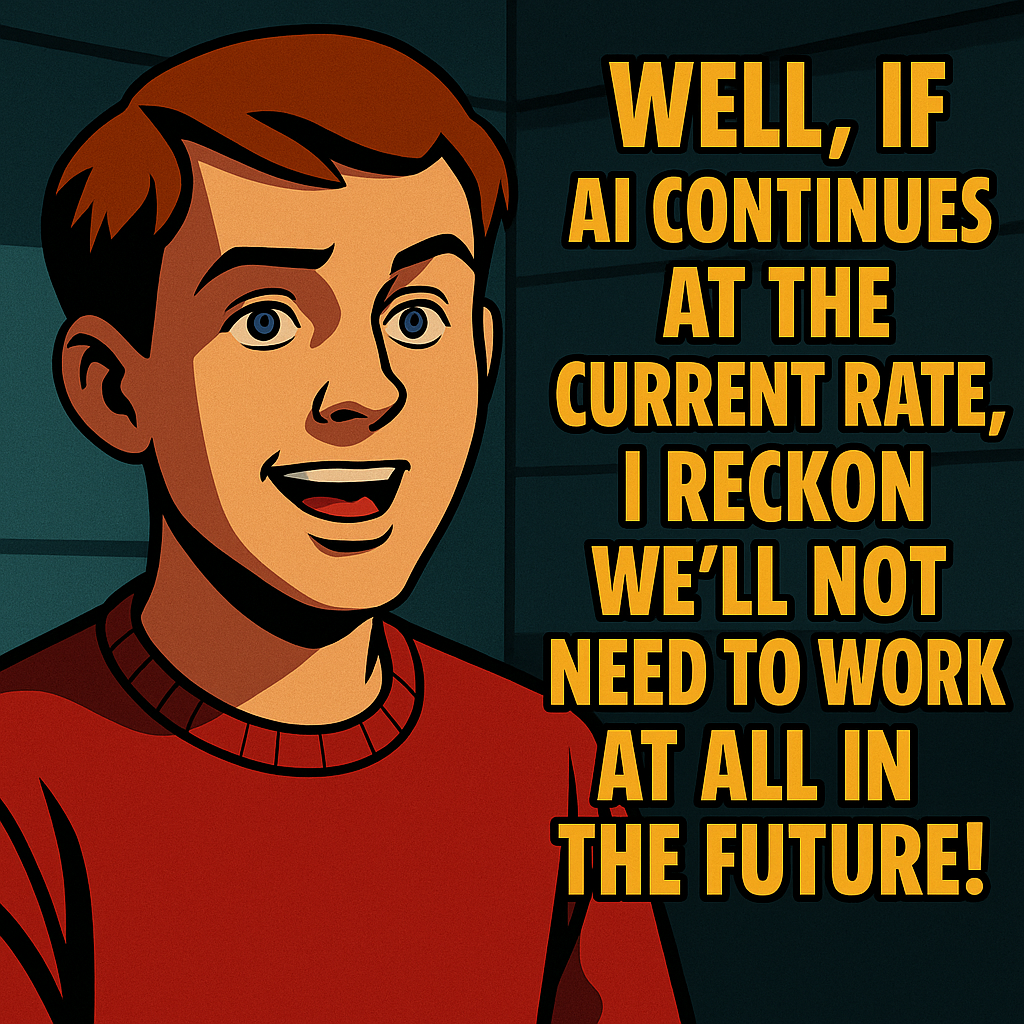
- How can individuals help reduce global warming?
- What will happen if we don’t take action against climate change?
- How do you think technology will change people’s lives in the future?
- What will happen if people rely too much on smartphones?
- How will online learning affect traditional education?
- What will happen if schools stop teaching arts subjects?
- How might automation affect employment in the future?
- What will happen if people continue working long hours?
- What changes do you think will happen in family life in the future?
- How might cities change in the next few decades?
- How will people’s relationships change if everyone works online?
- What will happen if schools start using AI tutors instead of teachers?
- What will happen if students rely only on online learning?
- What might happen if more people move from rural areas to big cities?
- What will happen if people keep eating fast food regularly?
- What will happen if countries become more culturally similar?
Potential Answers
1.How can individuals help reduce global warming?
→ If people recycle more and use public transport, pollution will decrease.
2. What will happen if we don’t take action against climate change?
→ If we ignore it, the planet will face more extreme weather events.
3. How do you think technology will change people’s lives in the future?
→ If technology keeps advancing, daily tasks will become much easier.
4. What will happen if people rely too much on smartphones?
→ If that continues, people will lose face-to-face communication skills.
5. How will online learning affect traditional education?
→ If online learning becomes more popular, fewer students will attend physical schools.
6. What will happen if schools stop teaching arts subjects?
→ If that happens, students will have fewer chances to develop creativity.
7. How might automation affect employment in the future?
→ If automation spreads, many routine jobs will disappear.
8. What will happen if people continue working long hours?
→ If people don’t balance work and rest, their health will suffer.
9. What changes do you think will happen in family life in the future?
→ If people keep moving abroad for work, families will spend less time together.
10. How might cities change in the next few decades?
→ If urbanisation continues, cities will become more crowded and expensive.
11. How will people’s relationships change if everyone works online?
→ If everyone works remotely, social connections will become weaker.
12. What will happen if schools start using AI tutors instead of teachers?
→ If schools rely on AI tutors, students will miss personal guidance.
13. What will happen if students rely only on online learning?
→ If students study only online, they’ll have fewer chances to develop teamwork skills.
14. What might happen if more people move from rural areas to big cities?
→ If that trend continues, rural communities will decline.
15. What will happen if people keep eating fast food regularly?
→ If people don’t change their diets, obesity rates will rise.
16. What will happen if countries become more culturally similar?
→ If cultures keep blending, traditional customs will gradually disappear.
🧠 Exercise 6- Practice using Conditionals + Relative Clauses
Task: i) Answer the question using any conditional then ii) elaborate/expand on it using a relative clause.
Example Question: Do you prefer to use public transport or your own car?
Answer:
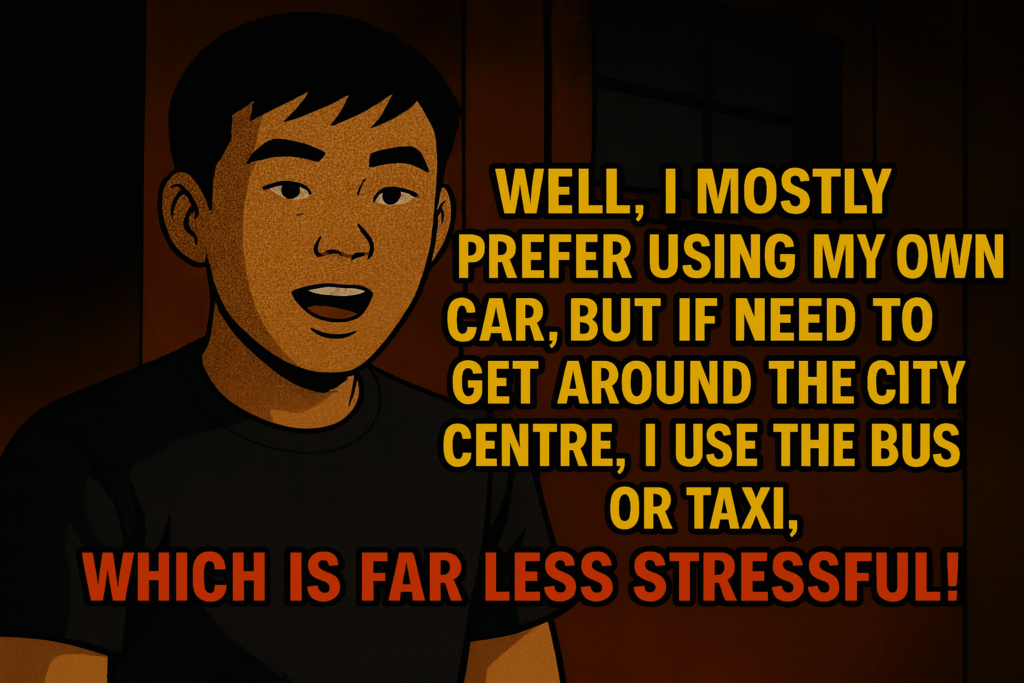
All Conditionals Quick View

- Do you spend much time with your family?
- Describe a place you visited that surprised you.
- How can schools or workplaces encourage creativity?
- What should governments do to preserve cultural traditions?
- Do you use social media often? If so, which ones?
- Do you prefer to go out or stay indoors in your free time?
- Describe a course that you were glad you took.
- How will transport / communication evolve in the next 20 years?
- What impact does advertising / media have on culture or behaviour?
- Do you think people’s lifestyle changes (due to work, tech) affect health / well-being?
- What are the challenges of living in crowded cities?
- Describe an occasion when you lost something.
- Describe a time when you made a difficult decision.
- What motivates people to volunteer / help others?
- Should traditions always be kept, or changed over time?
- Is patience an important skill in modern life?
- What factors influence someone’s career choice?
- What are the benefits and difficulties of learning a new language later in life?
Potential Answers
1. Do you spend much time with your family?
→ Maybe 4-5 hours a week? It depends. If they are not away with their friends, we usually go for walks and have dinner together, which I really enjoy.
2. Describe a place you visited that surprised you.
→ Cagliari for sure! If I hadn’t gone to visit my mate who lives there, I probably wouldn’t have visited it, which would’ve been a tragedy because it’s awesome!
3. How can schools or workplaces encourage creativity?
→ If schools gave students cooler and more challenging projects like designing a product or selling something online, I think they would come up with some super creative ideas, which would be incredible!
4. What should governments do to preserve cultural traditions?
→ Funding I’d say. If they invested more in fun and interesting cultural festivals, they would probably entice more young people to take an interest, which would likely help in preserving those traditions.
5. Do you use social media often? If so, which ones?
→ Quite a lot to be honest. If I want to stay updated, I scroll through X, but for entertainment I go on Youtube or Instagram, which have so many interesting videos.
6. Do you prefer to go out or stay indoors in your free time?
→ If the weather’s nice, I prefer going out to parks or cafes, which help me relax and unwind after a long week.
7. Describe a course that you were glad you took.
→ Public speaking. If I hadn’t taken that course, I’d still be terrified of presenting in meetings, which used to be a huge problem for me.
8. How will transport / communication evolve in the next 20 years?
→ Well, if it keeps going at this pace, we’ll probably have driverless cars and instant translation devices in no time, which is both amazing and scary at the same time!
9. What impact does advertising / media have on culture or behaviour?
→ A massive impact. If people have a lot of advertising in their lives, they might be more susceptible to buying things they don’t need, which is really sad to be honest because these material things are often unfulfilling.
10. Do you think people’s lifestyle changes (due to work, tech) affect health / well-being?
→ 100%. If people people don’t get outside enough or socialise with others, they really start feeling isolated and perhaps even antisocial, which is not great for society in general in my opinion.
11. What are the challenges of living in crowded cities?
→ Mmm, well, if you live in a crowded city, you often deal with traffic and noise, which can be quite stressful.
12. Describe an occasion when you lost something.
→ I lost my wallet on the train once. If I hadn’t got distracted by my friend, which always happens, I wouldn’t have forgot it!
13. Describe a time when you made a difficult decision.
→ If I hadn’t trusted my instincts, I might have chosen the wrong university, which would have changed my entire career path.
14. What motivates people to volunteer / help others?
→ I think different reasons. If people experience kindness themselves, they’re more likely to volunteer, which creates a positive cycle of giving. But others might do it just because they grew up in that environment, whether it is with their church or school or whatever.
15. Should traditions always be kept, or changed over time?
→ That’s a hard one. If societies never adapted their traditions, they might lose relevance for young people, who need to see how culture connects to modern life. But also some traditions are super valuable and help to preserve important principles.
16. Is patience an important skill in modern life?
→ Absolutely! If you don’t have patience, you’ll struggle to deal with the stress, which is part of the modern world we live in sadly!
17. What factors influence someone’s career choice?
→ Oh, I think there are loads. If people grow up in supportive environments, they might follow their passions, which leads to more satisfying careers. But if they grew up poor, they may look for stable and well-paid jobs.
18. What are the benefits and difficulties of learning a new language later in life?
→ Well, if adults keep practicing regularly, they can definitely master a new language, which also keeps their minds sharp, though it might take more time than when they were younger.
Final Test
Part 1: Multiple Choice – Structure Recognition
Choose the correct option to complete the sentences. Pay close attention to the time references and whether the situation is real or imaginary.
- If you mix blue and yellow paint, you ______ green paint.
a) get
b) will get
c) got
d) would get - I feel sick right now. If I hadn’t eaten that three-day-old sushi yesterday, I ______ fine today.
a) would have been
b) will be
c) would be
d) am - If it ______ sunny tomorrow, we will go for a picnic.
a) will be
b) is
c) was
d) were - I didn’t know you were in town last night. If I had known, I ______ you.
a) would call
b) will call
c) called
d) would have called - He doesn’t have enough money to buy that car. If he ______ more money, he would buy it.
a) has
b) had
c) would have
d) had had - If I ______ you, I wouldn’t mention the mistake to the boss.
a) was
b) am
c) were
d) have been - If you press this button, the machine ______ off immediately. It happens every time.
a) turned
b) turns
c) will turn
d) would turn - She missed her flight. She ______ in Paris right now if she had woken up on time this morning.
a) would be
b) would have been
c) will be
d) is - We were lost for hours. If we had brought a map, we ______ so late.
a) wouldn’t be
b) hadn’t been
c) wouldn’t have been
d) won’t be - If I win the lottery next week, I ______ a round-the-world trip.
a) book
b) would book
c) booked
d) will book
Part 2: Verb Conjugation – Context Clues
Fill in the blanks with the correct form of the verb in parentheses. Look for clues like “now,” “yesterday,” or general facts to determine the correct conditional type.
- (Zero) Oil floats if you ____________ (pour) it onto water.
- (Third) The team lost the match yesterday. They would have won if their best player ____________ (not be) injured.
- (First) I promise I ____________ (help) you with your homework as soon as I finish mine.
- (Second) I hate my job. If I ____________ (can) find a better one, I would quit tomorrow.
- (Mixed) I didn’t study for the test last night, and now I am nervous. If I had studied, I ____________ (not be) so worried right now.
- (Second): It’s raining. If it ____________ (stop) raining right now, we could go for a walk.
- (First): If she ____________ (not hurry), she will miss the bus.
- (Mixed) She is fluent in Spanish today because she lived in Madrid for five years. If she hadn’t lived there, she ____________ (not speak) it so well now.
Part 3: Sentence Transformation
Read the situation and rewrite it as a conditional sentence.
Example Situation: I don’t have a car, so I have to take the bus.
Conditional: If I had a car, I wouldn’t have to take the bus.
- Situation (Fact): People get hungry if they don’t eat.
If people don’t eat, __________________________________. - Situation (Future Possibility): Perhaps it will snow this weekend. Then we can go skiing.
If it snows this weekend, __________________________________. - Situation (Past Regret): You didn’t tell me it was her birthday yesterday, so I didn’t buy her a gift.
If you had told me it was her birthday, __________________________________. - Situation (Present Hypothetical): I live in a tiny apartment. I can’t get a Great Dane dog.
If I lived in a big house, __________________________________. - Situation (Mixed – Past cause, present result): He crashed his car last week. He has to walk to work today.
If he hadn’t crashed his car last week, __________________________________.
Answers
Reveal Answers
Part 1: Multiple Choice
- a) get (Zero Conditional: A general scientific fact. Mistake: using ‘will get’ treating it as a specific future event.)
- c) would be (Mixed Conditional: Past hypothetical cause “hadn’t eaten” leads to present hypothetical result “would be fine today”. Mistake: using ‘would have been’ which refers to a past result.)
- b) is (First Conditional: Real future possibility. Common Mistake: Using ‘will be’ in the if-clause.)
- d) would have called (Third Conditional: A hypothetical situation specifically in the past.)
- b) had (Second Conditional: A hypothetical situation in the present. Mistake: using present tense ‘has’.)
- c) were (Second Conditional: Standard subjunctive form for advice “If I were you”. ‘Was’ is accepted informally, but ‘were’ is technically correct. Mistake: using present ‘am’.)
- b) turns (Zero Conditional: “It happens every time” indicates a general truth/habit.)
- a) would be (Mixed Conditional: Past counter-factual event affects the present moment “right now”.)
- c) wouldn’t have been (Third Conditional: Both the cause (no map) and result (being late) happened in the past.)
- d) will book (First Conditional: A real possibility in the future.)
Part 2: Verb Conjugation
- pour (Zero: General fact, present tense in both clauses.)
- had not been / hadn’t been (Third: Hypothetical past condition.)
- will help / ‘ll help (First: Future promise.)
- could (Second: Hypothetical ability in the present. ‘Could’ is the past tense of ‘can’ used here for unreal meaning.)
- would not be / wouldn’t be (Mixed: Past cause leads to present result “right now”.)
- stopped (Second: Hypothetical desire about the present moment. Mistake: using present ‘stops’.)
- does not hurry / doesn’t hurry (First: Present tense required in the if-clause for future meaning. Mistake: using ‘will not hurry’.)
- would not speak / wouldn’t speak (Mixed: Past reality affects present ability “now”.)
Part 3: Sentence Transformation
1. If people don’t eat, they get hungry. (Zero Conditional)
2. If it snows this weekend, we can/will go skiing. (First Conditional)
3. If you had told me it was her birthday, I would have bought her a gift. (Third Conditional)
4. If I lived in a big house, I could get (or would get) a Great Dane dog. (Second Conditional)
5. If he hadn’t crashed his car last week, he wouldn’t have to walk to work today (or ‘he wouldn’t be walking to work today’). (Mixed Conditional)

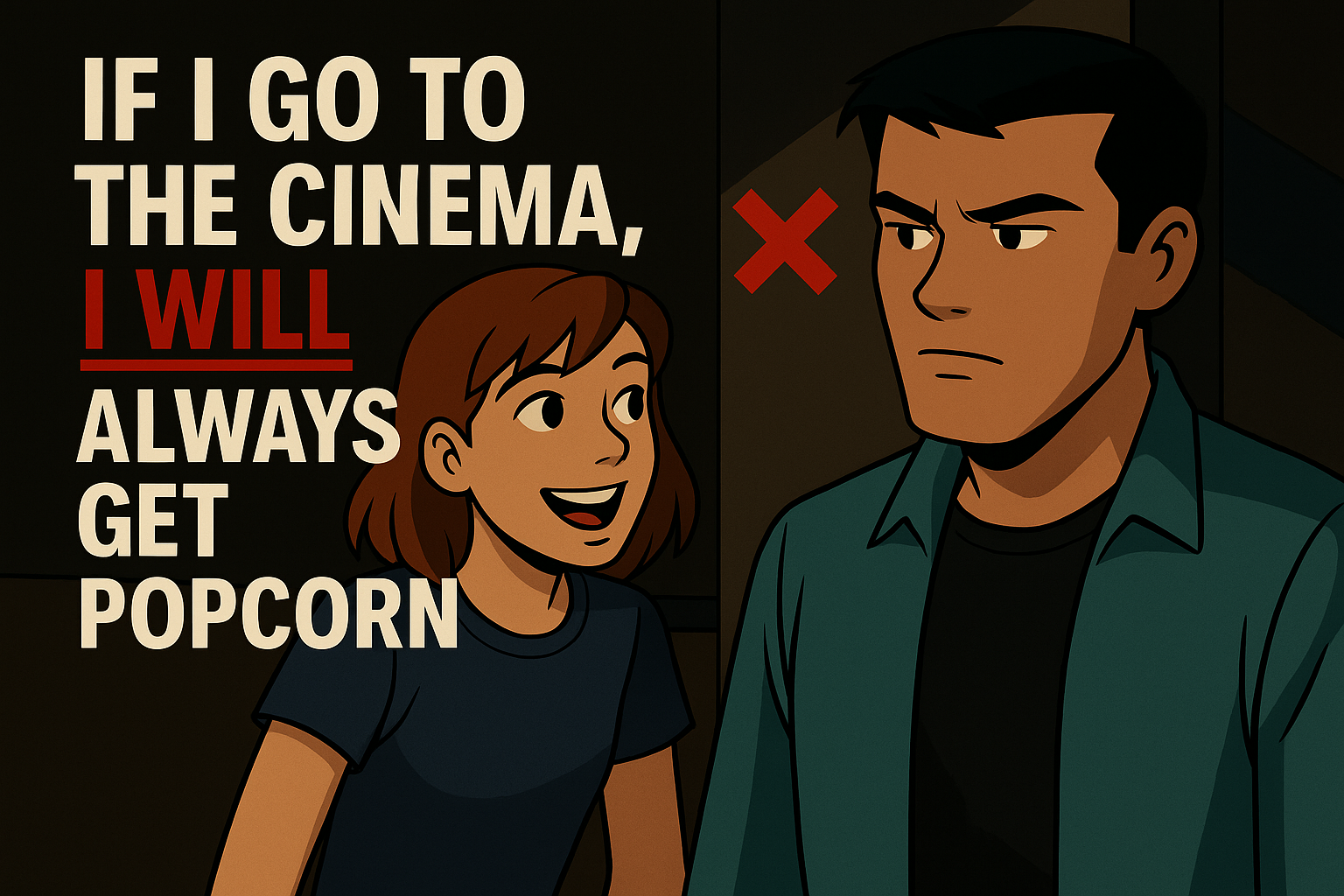
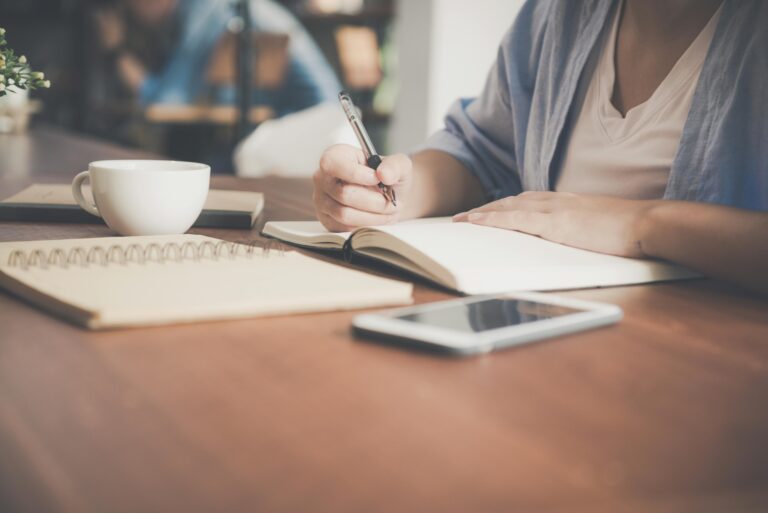
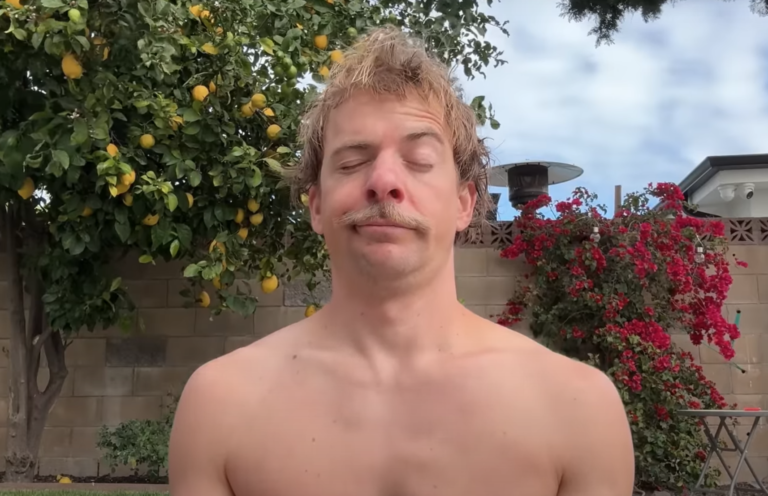
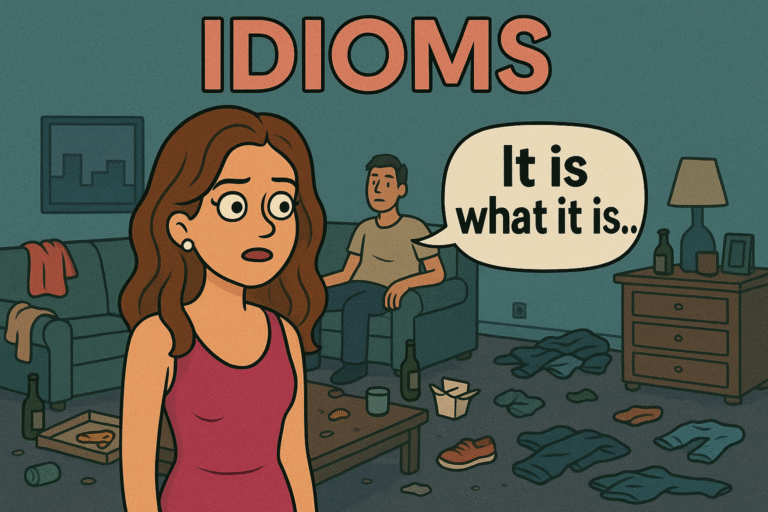


![How did young Cristiano Ronaldo struggle with poverty? [Ronaldo EP.01]](https://nativeenglishacademy.org/wp-content/uploads/2024/09/Screenshot-2024-09-15-at-12.45.08-1-768x720.png)